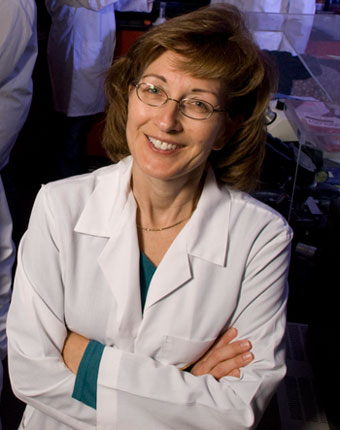USF Excellence in Innovation Award goes to Dr. Kruk
New technology she discovered could lead to a commercial test for early detection of ovarian cancer
Patricia A. Kruk, PhD, a USF Health professor of pathology and cell biology whose promising research could lead to a simple, more sensitive screening test for ovarian cancer, received a University of South Florida 2010 Excellence in Innovation Award.
Dr. Kruk was one of two faculty members presented with the award Oct. 12 at the USF Academy of Inventors luncheon, a part of the week’s ResearchOne activities. She was recognized for her exceptional achievements in innovation and translational research achievements in the field of ovarian cancer. Donald Haynie, PhD, of the Department of Physics, the other recipient, was recognized for his exceptional work in the field of nanotechnology and bioengineering.
Dr. Kruk studies molecular changes responsible for early stages of ovarian cancer – a deadly disease with vague symptoms and no sufficiently accurate early screening test. She has worked with colleagues at USF and Moffitt Cancer Center to develop urinary biomarkers for cancer detection. They found that the level of an anti-apoptotic protein in urine, called Bcl-2, is 10 times higher in women with ovarian cancer than it is in healthy women. A patent is pending for her method to detect ovarian cancer by measuring urinary levels of Bcl-2.

Patricia Kruk, PhD
“It is truly an honor to be recognized by the National Academy of Inventors founded here at USF,” Dr. Kruks said. “The Academy and its members are an important resource whose guidance I will rely on in the translation of this technology to clinical application and, thereby, hopefully help reduce the mortality of ovarian cancer, the deadliest gynecologic cancer.”
“Dr. Kruk is an enthusiastic scientist, a team player and an internationally recognized expert on the cell biology of sporadic and familial ovarian cancer,” said Santo Nicosia, MD, distinguished USF professor and chair of the Department of Pathology and Cell Biology. “A remarkable asset to this University, she will continue to contribute with high distinction to basic and translational research.”
After receiving her PhD in Medical Sciences in 1992 from the University of British Columbia, Canada, Dr. Kruk pursued a postdoctoral fellowship at the National Institute on Aging at the National Institutes of Health. When she joined the USF College of Medicine in 1996, Dr. Kruk was already known for originating a successful technique to isolate and culture ovarian surface epithelial cells, including those derived from women with inherited ovarian cancer.
At USF she developed a research project focused on the molecular regulation and biological consequences of reactivation of the enzyme telomerase in ovarian cancer. Her laboratory demonstrated for the first time that vascular endothelial growth factor regulates telomerase activity in non-vascular cells and is a new molecular target for lysophophatidic acid in cancer cells. She and colleagues also showed that telomerase not only promotes cancer cell survival but also confers resistance to chemotherapy by boosting expression of the protein Bcl-2. This work led to the development at USF by Dr. Kruk of a test for early detection of ovarian cancer using a patient’s urine sample. USF is actively pursuing a licensing partner for this technology.
Dr. Kruk has attracted more than $1.6 million in American Cancer Society and U.S. Department of Defense grants. She is the author of more than 40 peer-reviewed publications and four book chapters, and has presented at 14 invited seminars, including the prestigious Telomeric Instability in Ovarian Cancer at the University of British Columbia. She is a member of the Florida Center of Excellence for Biomolecular Identification and Targeted Therapeutics.
Story by Anne DeLotto Baier and photo by Eric Younghans, USF Health Communication
RELATED STORY:
Outstanding faculty research rewarded

